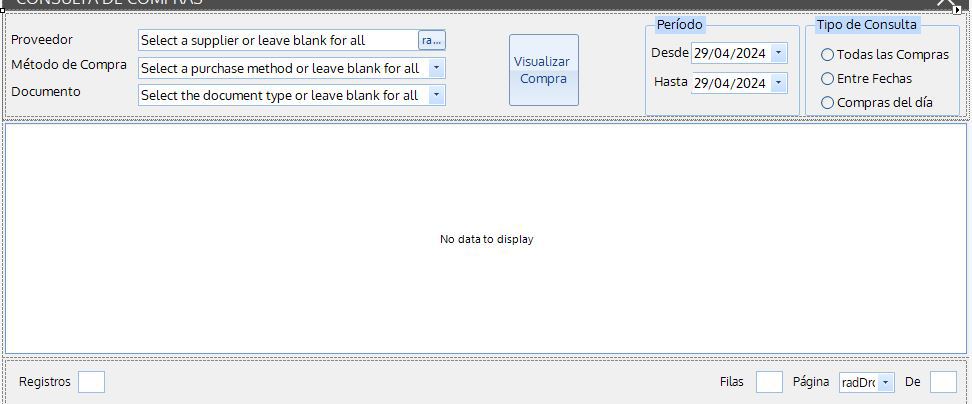I'm trying to write a SQL query that retrieves all records from a table, but I also want to be able to filter the results by date range. I'm using stored procedures to execute the query, and I'm passing date parameters to the stored procedure. However, I'm having trouble passing NULL values for the date parameters. I've tried using various methods, such as setting the parameter to NULL or using the ISNULL() function, but I'm still getting errors.
I'm using SQL Server 2019. Is there a way to pass NULL date parameters in SQL Server?
"I'm using the BETWEEN clause to filter records by date range. This is the code I have written so far."
-- Declaración de variables para la paginación
DECLARE @Numero_Pagina INT = 1, @Filas_x_Pagina INT = 3;
-- Declara variables para filtrar por rango de fechas
DECLARE @Fecha_Inicio DATE,
@Fecha_Fin DATE,
--Declara variables para poder filtrar por el Id del proveedor para que haga select de todos o de uno que se especifique
@IdProveedor CHAR = NULL, --'PRO-0000001', -- NULL significa todos los proveedores
----Declara variables para poder filtrar por el tipo de documento de compra
@TipoDocCompra VARCHAR(50) = NULL, -- NULL significa todos los tipos de documento
----Declara variables para poder filtrar por la modalidad de pago
@ModalidadPago VARCHAR(50) = NULL; -- NULL significa todas las modalidades de pago-- Consulta para obtener las compras y sus detalles
WITH Compras AS (
SELECT
MC.IdMaestroCompra, -- No se va a mostrar
MC.NumeroCompra, -- Este es el correlativo de la compra de la base de datos
MC.NroDocumento, -- El número de documento de la compra, puede ser la factura o boleta
MC.FechaCompra,
P.RazonSocial,
P.Contacto,
P.RucNit,
P.TelContacto,
MC.TotalCompra,
MC.ModalidadPago,
MC.TipoDocCompra,
U.NombreUsuario,
ROW_NUMBER() OVER (ORDER BY MC.IdMaestroCompra) AS RowNum
FROM
dbo.MaestroCompra AS MC
INNER JOIN
dbo.DetalleCompra AS DC ON MC.IdMaestroCompra = DC.IdMaestroCompra
INNER JOIN
dbo.Proveedor AS P ON MC.IdProveedor = P.IdProveedor
INNER JOIN
dbo.Usuarios AS U ON MC.IdUsuario = U.IdUsuario
WHERE
Convert(date,MC.FechaCompra) BETWEEN @Fecha_Inicio AND @Fecha_Fin
AND (@IdProveedor IS NULL OR MC.IdProveedor = @IdProveedor)
AND (@TipoDocCompra IS NULL OR MC.TipoDocCompra = @TipoDocCompra)
AND (@ModalidadPago IS NULL OR MC.ModalidadPago = @ModalidadPago)
)
-- crea una condicion para la paginación
SELECT
IdMaestroCompra,
NumeroCompra,
NroDocumento,
FechaCompra,
RazonSocial,
Contacto,
RucNit,
TelContacto,
TotalCompra,
ModalidadPago,
TipoDocCompra,
NombreUsuario
FROM
Compras
WHERE
RowNum BETWEEN (@Numero_Pagina - 1) * @Filas_x_Pagina + 1 AND @Numero_Pagina * @Filas_x_Pagina;
GO
-- Consulta para obtener el número total de compras
SELECT COUNT(*) AS TotalCompras FROM dbo.MaestroCompra;
"I am also attaching the form that I have created for data entry. Once all the data has been entered, users will be able to apply various filters to the data as needed."

"I would also be grateful if you could offer your insights on the pagination method I am currently employing and suggest any more efficient approaches that might be available."
"I am encountering an error and require assistance in resolving it. The error appears to be related to the BETWEEN clause, which is not accepting null values. I would appreciate any guidance you can provide on how to address this issue."

